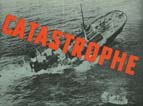Becoming the Enemy
Scary times more or less. Intimidation if you ask me. That's what it was. We slept in the open building on the floor with a blanket and the lights on. At night the guards would walk their way around the entire building. And the soldier with heavy boots. Boom, boom. All night. And I couldn't sleep.
Internee on his detention at the CNE grounds, Toronto, video interview, Columbus Centre Collection
We used to have a statue of Mussolini on a pedestal in the living room. So I picked up the statue, hid it under my blouse, or whatever I had on, and ran with the RCMP chasing me. And finally they caught up with me and brought me back to the house with the statue. And they confiscated that. Never saw it again.
Gloria Costantini Giroux, daughter of internee Giuseppe Costantini, recounting the day RCMP searched the family home, video interview, Columbus Centre Collection
My dad was working on the farm that day. He didn't work much on the farm because we had a hired man. My dad couldn't work with the coughing he had. But that day he was working out on the farm and the policeman just picked him up and didn't even let him change his clothes. Not even take a toothbrush. Never said goodbye to all the members of his family. Nothing. They just picked him up and took him to Camp Kananaskis.
Mary Biollo Doyle, daughter of internee John Oliver Biollo, video interview, Columbus Centre Collection
In a speech given on the evening of June 10, 1940, Italian dictator Benito Mussolini informed listeners that formal declarations of war had been sent to the governments of England and France. Within minutes, word reached Canadian Prime Minister Mackenzie King. Orders were quickly given to the Royal Canadian Mounted Police (RCMP) to arrest “persons of Italian nationality and origin who might be … capable of committing sabotage and other acts which would be detrimental to the welfare of [Canada] in the event of a war with Italy.” (Norman A. Robertson, Department of External Affairs, to Ernest Lapointe, Minister of Justice, May 29, 1940, Library and Archives Canada) This included individuals of Italian birth, living in Canada, who belonged to the fascio.
Mussolini’s decision to join the war on the side of Germany had many repercussions for Italian Canadians. Along with mass arrests and internment, many others faced enemy alien designations, loss of work, vandalism, verbal abuse, and violence. Families had to cope with the absence of a parent who was interned. In most cases, this caused a great deal of hardship.
Mass Arrests
Within half an hour of Mussolini’s declaration, police at the federal, provincial, and municipal levels were mobilized and began arresting individuals across the country. Suspects were taken from their place of work, and homes were ransacked by police in an attempt to find evidence.
Once in police custody, Italian Canadians were taken to local jails to await transfer to internment camps. Many had no idea why they found themselves in this situation. They were not told what was going to happen to them.



